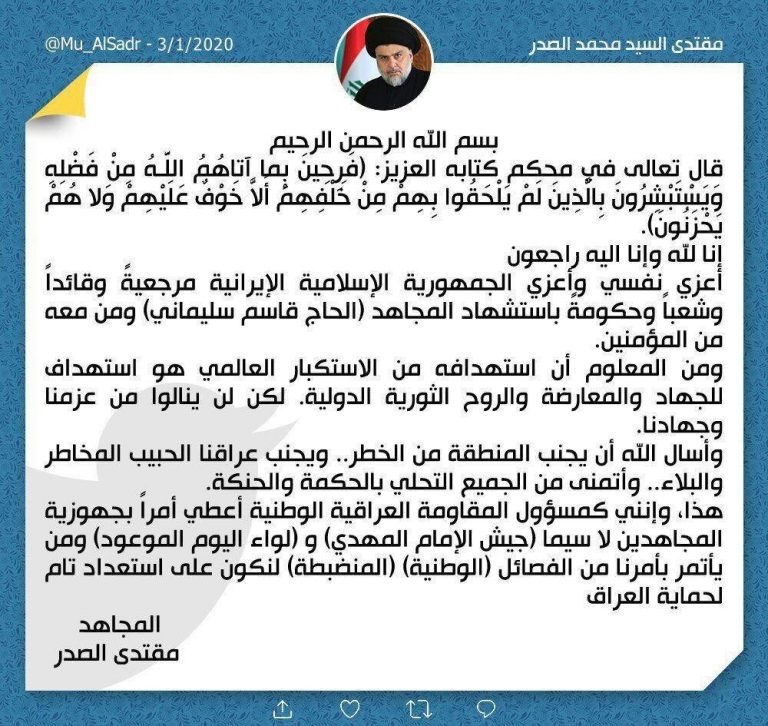
In the wake of the U.S. airstrike that killed Iranian Qods Force commander Qassem Soleimani and important militia leader Abu Mahdi al Muhandis, radical Shiite cleric Muqtada al Sadr has reactivated two of his longstanding militia forces in Iraq.
In his statement released online, Sadr says that “As an official of the great Iraqi national resistance, I order the mujahideen, particularly the Mahdi Army and the Promised Day Brigade, and whoever commands of us of the resistance factions, to be ready to fully protect Iraq.”
While offering his condolences to the Iranian government for the death of Soleimani, Sadr’s statement does not explicitly mention any revenge attacks against the U.S.
Sadr has worked hard to bolster his image as a Shia leader who is independent of Iran. Yet Sadr’s Mahdi Army is known to have received direct support from Soleimani and Qods Force. Sadr, aided by Qods Force, has fled to Iran multiple times after feeling threatened by the U.S. and Iraqi forces.
Even though Sadr has ordered the reactivation of the militias, it is not entirely accurate that the two have ceased operations. Sadr’s current militia, Saraya al Salam, or the Peace Companies, directly formed from the Mahdi Army/Promised Day Brigade network.
Sadr has claimed to have disbanded his militias in the past, only to have them revived in another form. The Mahdi Army was a driving force in the Shia insurgency in Iraq until Sadr claimed to have disbanded it in 2008 after the U.S. and Iraqi military assaulted it in Baghdad and southern Iraq in 2008. Some elements of the Mahdi Army fought under different names, such as Asaib al Haq, which was led by Sadr lieutenant Akram al Kaabi from 2007 to 2010, and Qais al Khazali from 2010 (Kaabi now controls another militia, Harakat al Nujaba, an offshoot of Asaib al Haq).
The core of the supposedly disbanded Mahdi Army became the Promised Day Brigades. It was tasked with targeting U.S. forces only, however it is known to have carried out many of the functions of the Mahdi Army.
Sadr formed Saraya al Salam in 2014 to combat the Islamic State as Iraqi forces in northern, central, and western Iraq disintegrated in its wake. In 2017, Sadr’s propagandist released videos of the deployment of its so-called “Rapid Intervention Brigade” in Salahadin province. Saraya al Salam fighters were driving tanks and other military vehicles.
While Sadr has not explicitly threatened U.S. interests in his recent statement, he has done so in the past. For instance, in 2016, as the militias and Iraqi security forces prepared to retake Mosul from the Islamic State, Sadr threatened to attack U.S. troops with his militia if additional soldiers were deployed to aid in the fight.
 Eurasia Press & News
Eurasia Press & News



